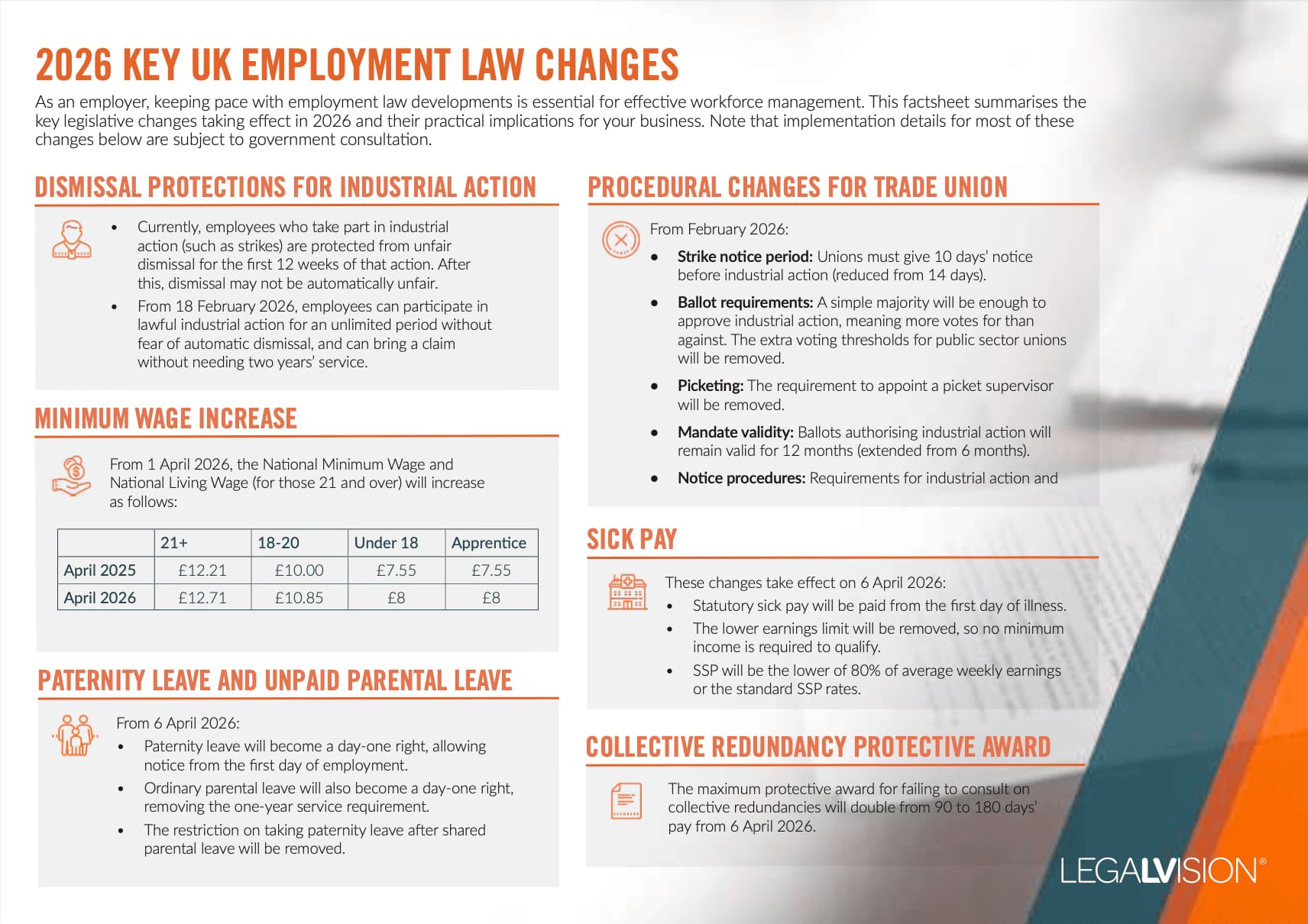In Short
- Dismissal in England must be for one of five fair reasons and follow a fair procedure.
- Failing to follow the Acas Code or contractual notice terms can lead to unfair or wrongful dismissal claims.
- Avoid dismissals linked to protected characteristics or automatically unfair reasons.
Tips for Businesses
Confirm you have a lawful reason for dismissal and document evidence before acting. Follow a fair disciplinary process aligned with the Acas Code, including investigation, hearing, and appeal. Check contractual notice and pay obligations to avoid wrongful dismissal. Apply policies consistently across staff and seek advice for complex or high-risk dismissals.
Summary
This article explains what employers in England must do to carry out a fair dismissal and avoid unfair or wrongful dismissal claims under UK employment law. Prepared by LegalVision, a commercial law firm specialising in advising clients on employment law and workplace disputes, it outlines lawful reasons, procedural requirements, and key risks when dismissing staff.
Deciding to dismiss one of your employees is an important decision you should not take lightly. After all, your staff’s job is their livelihood, and you have invested time and energy in training your staff. However, there will be times when dismissing a staff member is your only option. Nevertheless, if you carry out a dismissal, you must carry it out fairly. A fair dismissal means you follow the rules about dismissal and dismiss correctly. Otherwise, you could face an employment tribunal claim for unfair or wrongful dismissal. This article will explain what you should and should not do as an employer when dismissing staff in the UK.

This factsheet summarises the key legislative changes taking effect in 2026 and their practical implications for your business.
Do You Have One of the Five Legal Reasons for Dismissal?
Dismissing your employee is not fair unless your reason for dismissal is legal. Otherwise, if you do not have a lawful ground for dismissal, your employee may claim unfair dismissal. There are five legal reasons for dismissal, which include:
- conduct;
- capability;
- redundancy;
- a legal reason such as your employee losing their driving licence which they need for their job role; or
- other ‘substantial reasons’ which can cover a wide range of things.
Follow a Full, Fair and Reasonable Procedure
If you dismiss a staff member, you must follow a full, fair and reasonable dismissal procedure. Your procedure must mirror the Acas Code of Practice on disciplinary and grievance procedures.
If you have established a legal reason for the dismissal, your employee may try to claim unfair dismissal if the procedure is not full, fair, and reasonable. Additionally, an employment tribunal will consider whether you have followed the Acas Code if an employee initiates an unfair dismissal claim.
Continue reading this article below the formCall 0808 196 8584 for urgent assistance.
Otherwise, complete this form, and we will contact you within one business day.
Give Your Employee a Chance To Appeal
When you dismiss an employee, they may wish to appeal your decision. Allowing your employee a chance to appeal their decision could prevent them from taking you to an employment tribunal. Hence, your business should have an appeals process. This can include naming the person an employee should contact for an appeal and the timeframe to initiate an appeal.
Do Not Break Contractual Terms
You should not break your employees’ contractual terms when you dismiss them. If you do, they could claim wrongful dismissal, regardless of how long you have employed them.
Typical ways you may accidentally break your employee’s employment contract terms are dismissing an employee without:
- pay as stated in their contract; or
- the full notice period they are entitled to.
Do Not Dismiss for an Unfair Reason
Whilst there are five legal reasons for dismissal, there are some reasons that constitute unfair reasons. Therefore, you should avoid dismissal based on:
- pregnancy or maternity leave;
- flexible working requests;
- jury service;
- taking part in legal industrial action; and
- whistleblowing.
Do Not Apply Rules Inconsistently
When dismissing staff, do not make the mistake of applying rules inconsistently. Otherwise, you risk discriminating against staff. Discrimination is illegal when it is about one of the nine protected characteristics, including:
- race;
- religion;
- sex;
- age;
- sexual orientation;
- pregnancy and maternity;
- disability;
- gender reassignment; and
- marriage or civil partnership.
If your employee feels you have discriminated against them by dismissing them, they may make a claim in an employment tribunal.
Key Takeaways
Understanding what you can and cannot do when dismissing staff can help you avoid facing an employment tribunal for unfair dismissal. For example, you should not dismiss your staff for an unfair reason, such as pregnancy. Furthermore, you should not break your employee’s employment contract during dismissal. Nevertheless, you must take specific actions when dismissing your staff, such as having one of the five valid reasons for dismissal and following a fair and reasonable procedure when dismissing them.
If you need help understanding the dos and don’ts when dismissing staff in England, our experienced employment lawyers can assist as part of our LegalVision membership. For a low monthly fee, you will have unlimited access to lawyers to answer your questions and draft and review your documents for a low monthly fee. So call us today on 0808 196 8584 or visit our membership page.
Frequently Asked Questions
When dismissing staff, you should ensure that you do not stop your employee from appealing your decision if they wish to.
If you dismiss your staff, you should ensure that you follow a full, reasonable and fair procedure.
We appreciate your feedback – your submission has been successfully received.











